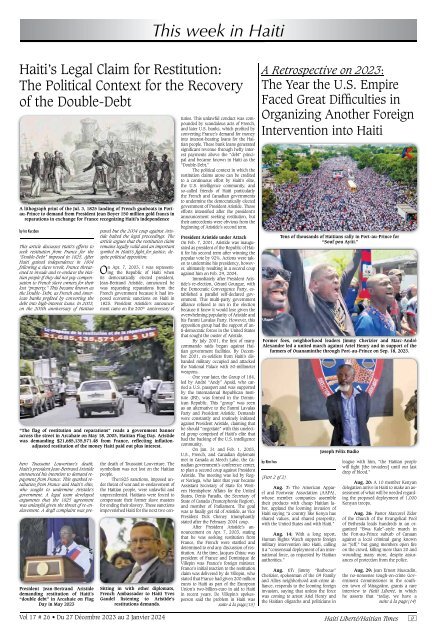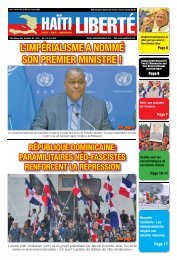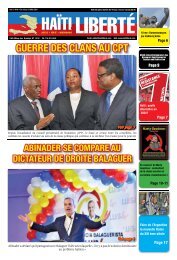Haiti Liberte 27 Decembre 2023
Create successful ePaper yourself
Turn your PDF publications into a flip-book with our unique Google optimized e-Paper software.
This week in <strong>Haiti</strong><br />
<strong>Haiti</strong>’s Legal Claim for Restitution:<br />
The Political Context for the Recovery<br />
of the Double-Debt<br />
A lithograph print of the Jul. 3, 1825 landing of French gunboats in Portau-Prince<br />
to demand from President Jean Boyer 150 million gold francs in<br />
reparations in exchange for France recognizing <strong>Haiti</strong>’s independence<br />
by Ira Kurzban<br />
This article discusses <strong>Haiti</strong>’s efforts to<br />
seek restitution from France for the<br />
“Double-Debt” imposed in 1825. After<br />
<strong>Haiti</strong> gained independence in 1804<br />
following a slave revolt, France threatened<br />
to invade and re-enslave the <strong>Haiti</strong>an<br />
people if they did not pay compensation<br />
to French slave owners for their<br />
lost “property.” This became known as<br />
the Double- Debt, as French and American<br />
banks profited by converting the<br />
debt into high-interest loans. In 2003,<br />
on the 200th anniversary of <strong>Haiti</strong>an<br />
hero Toussaint Louverture’s death,<br />
<strong>Haiti</strong>’s president Jean-Bertrand Aristide<br />
announced his intention to demand repayment<br />
from France. This sparked retaliation<br />
from France and <strong>Haiti</strong>’s elite,<br />
who sought to undermine Aristide’s<br />
government. A legal team developed<br />
arguments that the 1825 agreement<br />
was unlawful given the threat of re-enslavement.<br />
A draft complaint was prepared<br />
but the 2004 coup against Aristide<br />
halted the legal proceedings. The<br />
article argues that the restitution claim<br />
remains legally valid and an important<br />
symbol in <strong>Haiti</strong>’s fight for justice, despite<br />
political opposition.<br />
On Apr. 7, 2003, I was representing<br />
the Republic of <strong>Haiti</strong> when<br />
its democratically elected president,<br />
Jean-Bertrand Aristide, announced he<br />
was requesting reparations from the<br />
French government because it had imposed<br />
economic sanctions on <strong>Haiti</strong> in<br />
1825. President Aristide’s announcement<br />
came on the 200 th anniversary of<br />
“The flag of restitution and reparations” reads a government banner<br />
across the street in Arcahaie on May 18, 2003, <strong>Haiti</strong>an Flag Day. Aristide<br />
was demanding $21,685,135,571.48 from France, reflecting inflationadjusted<br />
restitution of the money <strong>Haiti</strong> paid out plus interest.<br />
AP<br />
President Jean-Bertrand Aristide<br />
demanding restitution of <strong>Haiti</strong>’s<br />
“double debt” in Arcahaie on Flag<br />
Day in May <strong>2023</strong><br />
AP<br />
AP<br />
Sitting in with other diplomats,<br />
French Ambassador to <strong>Haiti</strong> Yves<br />
Gaudel listening to Aristide’s<br />
restitutions demands.<br />
the death of Toussaint Louverture. The<br />
symbolism was not lost on the <strong>Haiti</strong>an<br />
people.<br />
The1825 sanctions, imposed under<br />
threat of war and re-enslavement of<br />
the <strong>Haiti</strong>an people, were unlawful and<br />
unprecedented. <strong>Haiti</strong>ans were forced to<br />
compensate their former slave masters<br />
for ending their slavery. These sanctions<br />
impoverished <strong>Haiti</strong> for the next two centuries.<br />
This unlawful conduct was compounded<br />
by scandalous acts of French,<br />
and later U.S. banks, which profited by<br />
converting France’s demand for money<br />
into interest-bearing loans for the <strong>Haiti</strong>an<br />
people. These bank loans generated<br />
significant revenue through hefty interest<br />
payments above the “debt” principal<br />
and became known in <strong>Haiti</strong> as the<br />
“Double-Debt.”<br />
The political context in which the<br />
restitution claims arose can be credited<br />
to a continuous effort by <strong>Haiti</strong>’s elite,<br />
the U.S. intelligence community, and<br />
so-called friends of <strong>Haiti</strong> particularly<br />
the French and Canadian governments<br />
to undermine the democratically elected<br />
government of President Aristide. Those<br />
efforts intensified after the president’s<br />
announcement seeking restitution, but<br />
their antecedents were obvious from the<br />
beginning of Aristide’s second term.<br />
President Aristide under Attack<br />
On Feb. 7, 2001, Aristide was inaugurated<br />
as president of the Republic of <strong>Haiti</strong><br />
for his second term after winning the<br />
popular vote by 92%. Actions were taken<br />
to undermine his presidency, however,<br />
ultimately resulting in a second coup<br />
against him on Feb. 29, 2004.<br />
Immediately after President Aristide’s<br />
re-election, Gérard Gourgue, with<br />
the Democratic Convergence Party, established<br />
a parallel self-declared government.<br />
This multi-party government<br />
alliance refused to run in the election<br />
because it knew it would lose given the<br />
overwhelming popularity of Aristide and<br />
his Fanmi Lavalas Party. However, this<br />
opposition group had the support of anti-democratic<br />
forces in the United States<br />
that sought the ouster of Aristide.<br />
By July 2001, the first of many<br />
commando raids began against <strong>Haiti</strong>an<br />
government facilities. By December<br />
2001, ex-soldiers from <strong>Haiti</strong>’s disbanded<br />
military occupied and attacked<br />
the National Palace with 50-millimeter<br />
weapons.<br />
One year later, the Group of 184,<br />
led by André “Andy” Apaid, who carried<br />
a U.S. passport and was supported<br />
by the International Republican Institute<br />
(IRI), was formed in the Dominican<br />
Republic. This “group” was seen<br />
as an alternative to the Fanmi Lavalas<br />
Party and President Aristide. Demands<br />
were constantly and routinely initiated<br />
against President Aristide, claiming that<br />
he should “negotiate” with this unelected<br />
group comprised of <strong>Haiti</strong>’s elite that<br />
had the backing of the U.S. intelligence<br />
community.<br />
On Jan. 31 and Feb. 1, 2003,<br />
U.S., French, and Canadian diplomats<br />
met in Canada at Meech Lake, the Canadian<br />
government’s conference center,<br />
to plan a second coup against President<br />
Aristide. The meeting was led by Roger<br />
Noriega, who later that year became<br />
Assistant Secretary of State for Western<br />
Hemisphere Affairs for the United<br />
States, Denis Paradis, the Secretary of<br />
State of Canada (Francophonie Region),<br />
and member of Parliament. The goal<br />
was to finally get rid of Aristide, as Vice<br />
President Dick Cheney triumphantly<br />
stated after the February 2004 coup.<br />
After President Aristide’s announcement<br />
on Apr. 7, 2003, stating<br />
that he was seeking restitution from<br />
France, the French were startled and<br />
determined to end any discussion of restitution.<br />
At the time, Jacques Chirac was<br />
president of France and Dominique de<br />
Villepin was France’s foreign minister.<br />
France’s initial reaction to the restitution<br />
claim was delivered by de Villepin, who<br />
stated that France had given 200 million<br />
euros to <strong>Haiti</strong> as part of the European<br />
Union’s two-billion-euro in aid to <strong>Haiti</strong><br />
in recent years. De Villepin’s spokesperson<br />
said the problem in <strong>Haiti</strong> was<br />
suite à la page(15)<br />
A Retrospective on <strong>2023</strong>:<br />
The Year the U.S. Empire<br />
Faced Great Difficulties in<br />
Organizing Another Foreign<br />
Intervention into <strong>Haiti</strong><br />
by Kim Ives<br />
(Part 2 of 2)<br />
Tens of thousands of <strong>Haiti</strong>ans rally in Port-au-Prince for<br />
“Souf pou Ayiti.”<br />
Former foes, neighborhood leaders Jimmy Cherizier and Marc-André<br />
Alexandre led a united march against Ariel Henry and in support of the<br />
farmers of Ouanaminthe through Port-au-Prince on Sep. 18, <strong>2023</strong>.<br />
Aug. 7: The American Apparel<br />
and Footwear Association (AAFA),<br />
whose member companies assemble<br />
their products with cheap <strong>Haiti</strong>an labor,<br />
applaud the looming invasion of<br />
<strong>Haiti</strong> saying “a country like Kenya has<br />
shared values, and shared prosperity,<br />
with the United States and with <strong>Haiti</strong>.”<br />
Aug. 14: With a long report,<br />
Human Rights Watch supports foreign<br />
military intervention into <strong>Haiti</strong>, calling<br />
it a “consensual deployment of an international<br />
force, as requested by <strong>Haiti</strong>an<br />
authorities.”<br />
Aug. 17: Jimmy “Barbecue”<br />
Cherizier, spokesman of the G9 Family<br />
and Allies neighborhood anti-crime alliance,<br />
responds to the looming foreign<br />
invasion, saying that unless the force<br />
was coming to arrest Ariel Henry and<br />
the <strong>Haiti</strong>an oligarchs and politicians in<br />
Joseph Félix Badio<br />
league with him, “the <strong>Haiti</strong>an people<br />
will fight [the invaders] until our last<br />
drop of blood.”<br />
Aug. 20: A 10 member Kenyan<br />
delegation arrive in <strong>Haiti</strong> to make an assessment<br />
of what will be needed regarding<br />
the proposed deployment of 1,000<br />
Kenyan troops.<br />
Aug. 26: Pastor Marcorel Zidor<br />
of the Church of the Evangelical Pool<br />
of Bethesda leads hundreds in an organized<br />
“Bwa Kale”-style march in<br />
the Port-au-Prince suburb of Canaan<br />
against a local criminal gang known<br />
as “Jeff,” but gang members open fire<br />
on the crowd, killing more than 20 and<br />
wounding many more, despite assurances<br />
of protection from the police.<br />
Aug. 29: Jean Ernest Muscadin,<br />
the no-nonsense tough-on-crime Government<br />
Commissioner in the southern<br />
town of Miragoâne, grants a rare<br />
interview to Haïti Liberté, in which<br />
he asserts that “today, we have a<br />
suite à la page(14)<br />
Vol 17 # 26 • Du <strong>27</strong> Décembre <strong>2023</strong> au 2 Janvier 2024<br />
<strong>Haiti</strong> Liberté/<strong>Haiti</strong>an Times<br />
9















